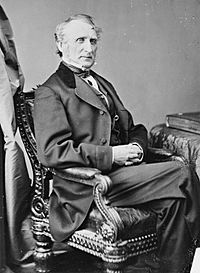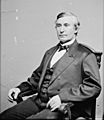Fourteenth Amendment to the United States Constitution facts for kids
The Fourteenth Amendment (also called Amendment XIV) is a very important part of the U.S. Constitution. It was added on July 9, 1868. This amendment is one of the Reconstruction Amendments, which were passed after the American Civil War.
The Fourteenth Amendment talks about who is a citizen and how everyone should have equal protection under the law. It was created to solve problems related to former slaves after the Civil War. Many Southern states did not like this amendment. They were made to agree to it so they could rejoin the United States Congress.
This amendment is used in more court cases than almost any other part of the Constitution. It has been the basis for major court decisions, like Roe v. Wade and Bush v. Gore. Many people think it is the most important amendment since the Bill of Rights was passed in 1791.
Contents
Why the Fourteenth Amendment Was Created
After the Civil War, Abraham Lincoln freed the slaves. But Congress had not passed a law to do this. Some states still had slavery. The Thirteenth Amendment officially ended slavery in late 1865.
Three years later, the Fourteenth Amendment was passed to give civil rights to freed slaves. Republicans were in charge of Congress then. They wanted to make sure freed slaves had full citizenship. However, they also knew that giving civil rights to Blacks might also lead to women's suffrage, which means giving women the right to vote. Congress did not want to do this at the time.
The first part of the amendment said "all persons born or naturalized in the United States." This would include women. So, the word "male" was added to Section Two. This made sure the amendment would be approved by Congress.
Section 1: Who is a Citizen?
The first part of the Fourteenth Amendment says that "all persons born or naturalized in the United States" are citizens. This means if you are born in the U.S., you are a citizen. It also means that people who become citizens through a legal process are citizens.
This section also has a very important part called the Privileges and Immunities Clause. It means that all Americans have certain basic rights and protections under the law. States cannot take away a person's life, freedom, or property without a fair legal process, called "due process".
States also cannot deny anyone "equal protection of the laws." This was a huge change. It meant that for the first time, all people, no matter their race, would have the same legal protections. The fact that states are mentioned means they must protect these rights, just like the federal government. This part of the Fourteenth Amendment is used in more lawsuits than any other amendment.
Section 2: Counting People for Congress
The second part of the Fourteenth Amendment changed an older rule in the Constitution. Before this amendment, slaves were counted as three-fifths of a person. This was used to figure out how many U.S. congressmen a state could have. This was called "apportionment".
Section Two made it clear that every citizen would be counted as one whole person. This was a big step towards equal representation for all people.
Sections 3, 4, and 5: Rules After the War
The third section of the amendment was strict with people who had fought against the United States in the Confederacy. It said that leaders of the Confederacy could not hold public office again unless two-thirds of Congress voted to allow it. To hold a federal office, former Confederates had to promise to support the Constitution.
Section Four said that the federal government would not pay back debts from the Confederacy. It also said that the U.S. would not pay for any losses related to slavery.
Section Five is simple: it says that Congress has the power to make laws to enforce all the rules in the Fourteenth Amendment.
Related pages
- Slavery
- Discrimination
- Dred Scott v. Sandford
- American Civil War
- Reconstruction of the United States
- Andrew Johnson
- Jim Crow laws
- Civil Rights Act of 1964
- Voting Rights Act of 1965
Images for kids
-
U.S. Senator from Michigan Jacob M. Howard, who helped write the Citizenship Clause
-
Rep. John Bingham of Ohio was the main writer of the Equal Protection Clause.
-
Thurgood Marshall was a key lawyer in the important Fourteenth Amendment case Brown v. Board of Education (1954).
See also
 In Spanish: Decimocuarta Enmienda a la Constitución de los Estados Unidos para niños
In Spanish: Decimocuarta Enmienda a la Constitución de los Estados Unidos para niños







